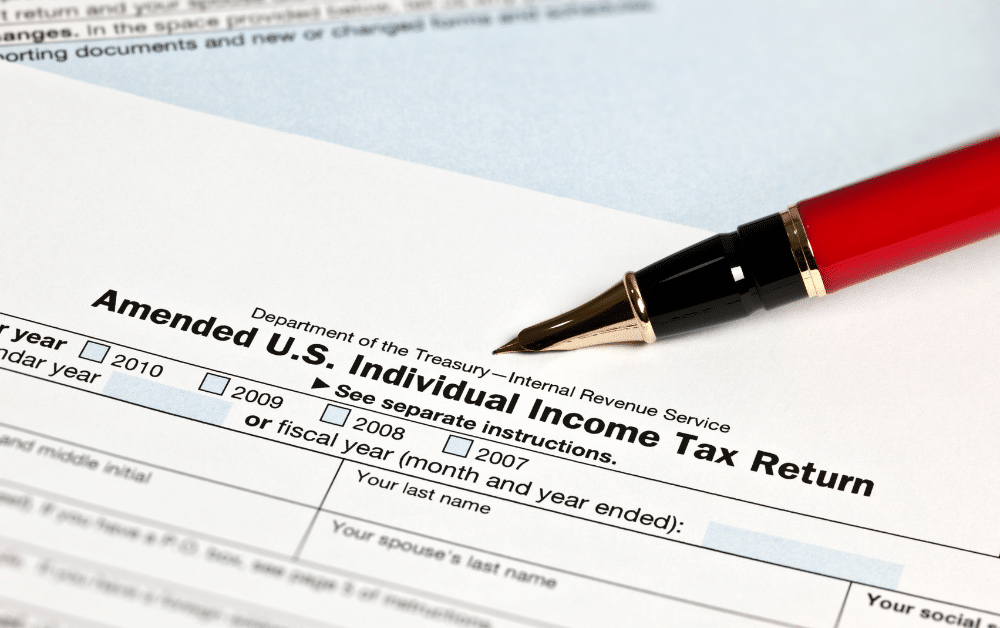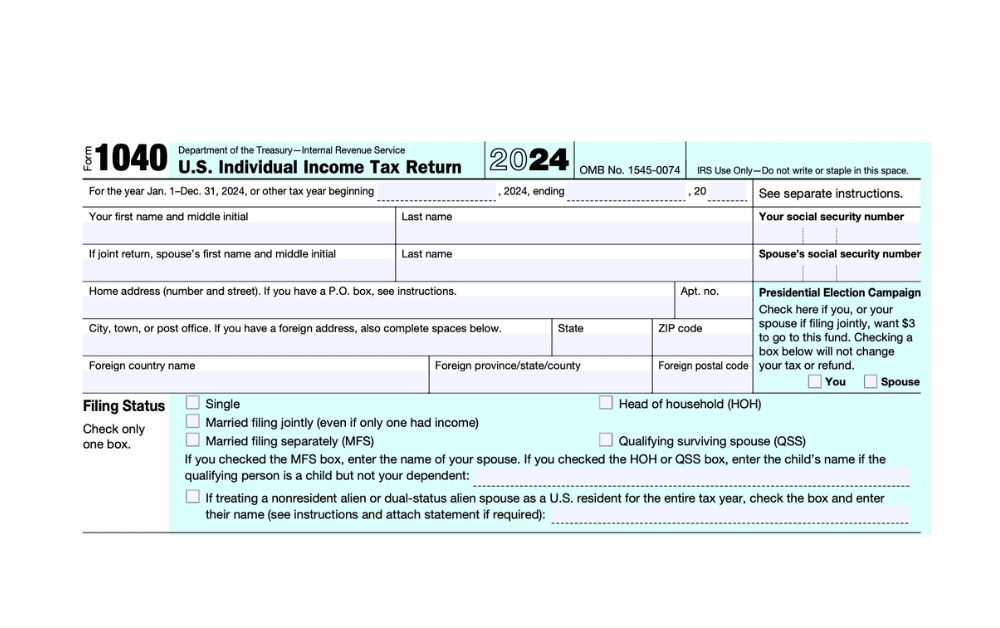Amending Your US Tax Return with Form 1040-X

Discovering an error on your tax return can be unsettling, but it’s a situation that can be rectified with an ‘amended tax return.’ But what exactly is an amended tax return? An amended tax return, formally known as IRS Form 1040-X, is the process used by taxpayers to correct mistakes or omissions on their original tax returns. Whether it’s a change in income, filing status, or deductions, filing an amended return is how you inform the IRS of these adjustments.
This guide is tailored to help you understand when and how to file an amended tax return, the implications for your taxes, and the specific considerations for expats who need to amend a tax return while living abroad.
Key Takeaways
- Expats can amend a previously filed tax return to fix mistakes or claim additional tax benefits.
- Some mistakes, such as calculation errors, do not require you to file an amended return.
- Amending a return could help you reduce your tax bill—or increase your refund.
What Is an Amended Tax Return?
If you need to update or correct information on a tax return, you can do so by filing an amended return. An amended tax return is simply a revised version of your original return, used to highlight any changes that the IRS should know about. The most common reasons for filing an amended tax return are:
- Fixing a mistake
- Reporting additional income
- Claiming a missed deduction or credit
To amend a return, fill out Form 1040-X and submit it to the IRS.

3 Common Reasons You May Want to Amend Your Tax Return
1. Correcting a Mistake
One common reason for amending a tax return is to correct a mistake. For example, let’s say John recently married. While doing his taxes, he checked “single” as his filing status out of habit. He only realized his mistake after he had already submitted his return.
To correct this, John filled out a copy of Form 1040-X with the correct filing status: “married, filing jointly.” He also recalculated his tax liability based on this new status, which reduced the amount he owed and allowed him to claim a refund.
2. Reporting Additional Income
Another common reason for an amended tax return is reporting additional income. For example, Jane moved to Mexico in 2023. She works as a nurse in a Mexican hospital and also receives income from rental properties in the US. She filed an expat tax return in 2024. However, she only reported her US-source rental income, as she was not aware that she had to report her foreign income as well.
After discovering her mistake, Jane filed an amended tax return for 2023, adding her salary as a nurse to her reported income. This will shield her from the penalties she might have faced for failing to report her worldwide income.
3. Claiming a Tax Benefit
As an American living overseas, you may be eligible for additional tax benefits. If you miss any of these potential benefits on your original return, you can file an amended tax return to claim them.
For example, Will moved to the UK in early 2022. He filed his first expat tax return in 2023 and paid the associated taxes. After consulting with an expat tax professional in 2024, he learned that he could have claimed the 2022 Foreign Tax Credit—which would have erased his US tax bill entirely.
Fortunately, John hasn’t missed his chance to optimize his taxes. With the help of his accountant, he can file an amended return and claim the Foreign Tax Credit retroactively. Once the IRS processes his amended return, they will send him a refund for the taxes he has already paid. John breathes a sigh of relief!
Regardless of your reason for amending an expat tax return, wait until the IRS has already processed your original return. That way, the IRS will be less likely to get your original return and your amended return mixed up. You can check the status of your original return by visiting the IRS website.
Situations When Amending Your Tax Return Isn’t Required
While amending a tax return can be useful, there are times when it isn’t necessary. For example, if you made a simple mathematical error when calculating your taxes, you won’t need to file an amended return. The IRS will correct that error and notify you of any changes to your tax bill or refund.
You also won’t need to file an amended tax return if you forgot to include a form, such as a W-2 or a schedule. If the IRS needs a copy of those forms, they will contact you to request it. Filing an amended return prematurely might complicate the situation unnecessarily.
Other times when you shouldn’t file an amended return include:
- After receiving most notices from the IRS unless directed in the letter to do so.
- After receiving an audit notice from the IRS, just carefully follow the instructions in the letter and be mindful of the deadlines established in the letter.
- After being notified that the IRS has rejected your electronically filed tax return, instead, either correct the issue that is preventing your return from being electronically filed or print, sign and mail your return.
Deadline for Filing an Amended Tax Return
You can file an amended tax return at any point after filing the original return. However, to receive a refund or claim a tax credit, you must amend a return before whichever of these two deadlines is later:
- Three years after filing your original return, or
- Two years after paying any tax you owed on your original return
If you filed your original return before it was due, the three-year deadline would start on the due date rather than the day you filed. For example, if the return was due on April 15, but you filed on February 1, you would have three years from April 15 to claim a credit or refund through an amended return.
If you requested an extension, on the other hand, the deadline will be three years from the date you filed the return, regardless of the due date. For example, if you requested an extension until October 15 and filed your return on August 1, the deadline for claiming a credit or refund would be three years from August 1.
If you are claiming an additional refund, wait until you receive your original refund before filing an amended return. If issued a check for your original refund, you can cash it prior to receiving your additional refund check.
How to Amend Your Tax Return
1. Gather the Right Documents
Before starting your Form 1040-X, make sure you have the documents you will need to complete it. For example, if you’re adjusting the income reported on your return, you may need new or amended W-2 or 1099 forms reporting the correct income amount. Or, if you’re hoping to claim a deduction or credit, you’ll need documentation to support your claim.
You will also need a copy of any tax forms you will be amending. Obviously, that starts with Form 1040, but it may also include certain schedules. For example:
- If you’re changing your itemized deductions, you’ll need a copy of the Schedule A you filed
- Changes to revenue or expenses from a business will require Schedule C and Schedule SE
- Adjusting your capital gains or losses will require copies of Form 8949 and Schedule D
…and so on.
2. Claim Any Credits or Deductions Available
No matter why you’re amending your tax return, it’s always a good idea to check for opportunities to reduce your tax bill. The IRS provides several tax benefits for Americans living abroad, such as the:
Using these benefits, most expats can erase their US tax bill altogether. Double-check your options when amending your return. An expat tax professional can advise you on the best choices for your situation.

3. Fill Out Form 1040-X
Next, just fill out Form 1040-X. This form is relatively straightforward, and the instructions are easy to understand. Simply enter the adjustments you want to make to your original return.
4. Submit Form 1040-X
Once you’ve completed Form 1040-X, you’re ready to submit it to the IRS, along with any supporting documents. If you filed your tax return online, you can e-file the amended return as well. If you filed your return through the mail, you will have to do the same with Form 1040-X.
The IRS has four mailing addresses. The correct option will depend on your location. For Americans living abroad, the standard address is:
Department of the Treasury
Internal Revenue Service
Austin, TX 73301-0215
USA
If you have to make an additional tax payment as a result of your amended return, include the check with your payment if you are mailing a paper form, or visit the IRS website to make an online payment.
5. Wait for a Response
Once submitted, the IRS will review the amended return and either approve or deny the changes. If the changes are approved, the IRS will issue a refund or send a bill for any additional tax owed.
Usually, the IRS takes up to 16 weeks to process an amended return. You can check the status of your amended return on the Where’s My Amended Return? Page on the IRS website.
If you owe additional taxes, file your amended return and pay the tax before the due date to limit interest and penalty charges that could accrue on your account. Interest is charged on any tax not paid by the due date of the original return without regard to extensions.
Amend Your US Tax Return with Help from an Expat Tax Expert!
We hope that this guide has helped you understand how to file an amended tax return as an American living abroad. If you still have questions, we have the answers! In fact, we can even prepare your expat taxes on your behalf.
At Greenback Expat Tax Services, we specialize in helping expats file their US taxes accurately and on time. Just contact us, and we’ll be happy to help you in any way we can.




